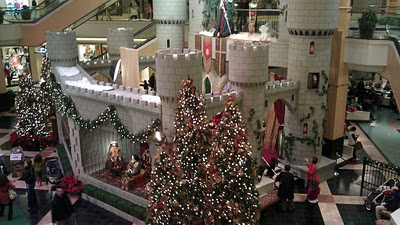Putting Christ Back into a Consumer-driven Christmas?
Every
year the Christmas season starts a little earlier. Now it starts at least as early as the day
after Halloween (All Saints Day), when the Halloween stuff goes on clearance
and the stores get ready for the next holiday.
Since Thanksgiving lacks the consumer cachet, the stores jump right to
Christmas. The official “buying season” begins
sometime Thanksgiving evening (as opposed to “Black Friday”), allowing the consumerist
side of Christmas to makes itself felt.
Now, don’t get me wrong. I’m no Grinch. I love Santa, all the carols (secular and
religious), and I even enjoy the giving and receiving of gifts.
I also understand that
in a consumer-driven economy, which for better or worse the United States
happens to be, we must buy if we and our neighbors hope to have jobs. I understand that most retail businesses
make all their profit during this end of the year season. If they don’t do well they can’t afford to
hire or even stay in business. Yes, I
understand all of this to be true, but I also understand that this
consumer-driven holiday season has nothing to do with Jesus or the holy season
of Christmas. These seasons may share a
name, but that’s all they share. In
orientation and purpose they are far apart – the story of the Magi not
withstanding! But I’m also aware that
there is a strong dark side to all of this.
It’s easy for the season be consumed by a consumerist mentality.
So,
what should Christians make of this holiday that takes its name from
Christ? Should we be offended by the
consumer side? Should we be offended if
people say “happy holidays” instead of Merry Christmas? Although there is an ever increasing chorus
of “complaints” about businesses that refuse to say Merry Christmas and that
schools no longer sing carols, what does this have to do with the sacred/holy
season of Christmas? And are we really
witnessing a “war on Christmas” being mounted by atheistic-liberal-secularists? Indeed, is this a sign that Christians are
being persecuted, as some suggest?
As we hear this growing
refrain, should we not stop to ask the question: What hath Christ to do with this
consumer-driven holiday season that draws its name from Jesus’ birth? I mean, what does Jesus have to do with
getting the latest I-Pad or Kindle Fire or X-Box or Barbie doll? Does
the trinket have less value if the clerk says “happy holidays” instead of “Merry
Christmas?”
I
wonder if perhaps we’ve confused two very different seasons that happen to be
running on parallel tracks. So, if we
can pull ourselves out of this consumer-driven season for a moment and consider
the story of Christmas as told in Scripture, perhaps we might see things
differently. Consider that according to
the two leading versions of the story, we don’t hear about Joseph and Mary throwing
a big birthday party, with lots of presents and cake and ice cream. No, as
the Gospel of Luke tells the story, Mary and Joseph are forced by the Empire to
return to Joseph’s ancestral home to register for a census. Because there’s no room for them in the inn,
they’re forced to make do with lodgings in the stable, along with the
animals. And as for Matthew, well, there
are gifts, but there’s also an escape and a slaughter – the latter at the hands
of the Empire’s proxy king. In the
teachings of Jesus, we see no suggestion that we should indulge in
consumerism. In fact, Jesus seems pretty
clear that God has called him to preach “good news to the poor,” and the news
isn’t a prosperity gospel nor is it a call to pull yourselves up from
bootstraps. I don’t remember reading
anything about the need for giving tax-breaks for “job creators.” I do remember him saying that it’s easier for
a camel to go through the eye of a needle than for a rich person to enter the
kingdom.
So
what do we make of this call to put Christ back into Christmas? Which Christmas are we talking about? As for me, the Christ that connects with
Christmas is the one I meet in worship on Christmas Eve and in the lives of
those who struggle to make a life for themselves in difficult times. Although I do believe Christ to be present in
the mall, I don’t think Christ is present in the consumerism celebrated at the
mall!

Comments
Thanks for this story -- yes, even if we like the Santa story, he is not the Spirit who "was made flesh and dwelt among us."
Bob